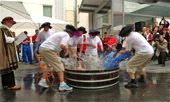Business News
100 years Druckhaus Dresden

Friday 03. October 2008 - Centenary celebrations with customers and suppliers
On 19th September, the printing house Druckhaus Dresden celebrated the centenary of its founding. It was in 1908 that Ernst Mayer had a factory built in what is now the city district of Striesen to commence the industrial-scale production of envelopes. The destruction at the end of the Second World War, reconstruction, nationalisation and reprivatisation after German Unification are just some of the turning points in the history of the business, which is today a joint-stock company with employee participation and counts a workforce of almost 80.
A new press and storage hall was opened in 2005 to raise the available production floor space from 3,000 to 5,000 m2. In the meantime, three medium-format presses of the Rapida 105 series have been installed: An eight-colour 4-back-4 perfector, a five-colour coater press and a four-colour perfector in a 2-back-2 configuration. KBA is thus the most important supplier of sheetfed offset presses to Druckhaus Dresden. The printers handle some 25 to 30 jobs every day, producing between 500,000 and 700,000 sheets in the process. “What we used to produce in a week can today be finished in a day,” says production manager Ingo Teubner to illustrate the greatly enhanced productivity of modern technologies.
But that is not all: Since 1998, directors Christl and Karl Nolle have been actively championing environmental awareness and reductions in CO2 emissions. Already back then, the provision of a central air supply and other measures permitted energy savings equivalent to 75 tonnes CO2. Despite the Kyoto Protocol, few other companies were at that time similarly concerned with sustainable development and the economical use of global resources. Druckhaus Dresden has been printing on eco-accredited Rapida sheetfed offset presses since 2003. Their installation was flanked by the realisation of a new energy and process management system, whose centralised measurement and control functions enabled a further 50 per cent reduction in energy consumption. The CO2 savings thus today total 150 tonnes per year (see also press releases 07-090 dated 6.9.2007 and 08-060 dated 2.6.08). Furthermore, Druckhaus Dresden is PSO-certified and offers its customers climate-neutral print production (ClimatePartner process). Upon request, each printed product is accompanied by a certificate specifying the amounts of CO2 compensated and the climate protection projects supported.
Social responsibility placed to the fore
Over 200 customers and suppliers from around the region joined the staff in Dresden to celebrate the centenary. In his welcoming address, director Karl Nolle emphasised the social responsibility which every entrepreneur holds for his employees. The “constitution” at Druckhaus Dresden thus reads: “Our most important assets are the people who work in our company and the spirit in which they do so.” Special thanks were extended to the company’s customers, whose orders ensure that wages and salaries can be paid, to its supplies, accountants and business advisors, and to the employees, whom he named individually. As a company with employee participation, Druckhaus Dresden offers all its employees the possibility to invest part of their income in the company at an attractive rate of interest. Over half of the workforce takes advantage of this opportunity.
Close partnership with KBA
Ralf Sammeck, KBA director for sheetfed sales, noted in his speech that both companies were of a similar age. The KBA facility in Radebeul celebrated its founding centenary ten years ago. KBA was thus all the more proud, he said, that such a close cooperation and technology partnership had developed in recent years and could now be continued into a second century.
During the subsequent print demonstration, the guests were able to witness the performance capabilities of the Rapida presses at first hand: Appropriate to the occasion, the five-colour coater printed a historical poster for the 1911 International Public Health Exhibition in Dresden – naturally at its full printing speed of 18,000 sph. A company of uniformed riflemen, a horse-drawn Radeberger beer wagon and a traditional initiation ceremony for the freshly qualified trainees recreated the atmosphere of the early years of Druckhaus Dresden. In addition, the guests were able to take a tour of the company, including the affiliated collotype museum workshop, whose machines were declared technical monuments by the State Office for Monument Preservation in 2001.
